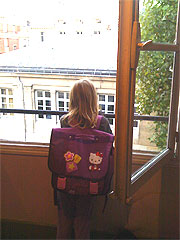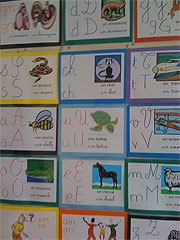The Appointment
The fluorescent light flickered on and off in the dingy stairwell. I climbed five flights to the top floor, pushed open the heavy metal door and walked down the narrow corridor. I could see into the classroom at the end of the hallway, its rows of tiny school desks with equally scaled chairs lined up in order, like prisoners tied together in a chain gang.

Earlier that morning – I had to rally the girls to get out the door to be on time for my 8:30 am meeting with the maitresse – Buddy-roo stopped on the landing just outside our apartment door and looked out the window. From the top floors of our building, you can see the courtyard and into the classrooms of her old school, a place that represents the oasis of songs, crayons, painting and games that are the first years of l’école maternelle. “Mama, look,” she said, the longing palpable in her voice, “those kids – that’s my old class!” She called out the names of her old classmates, shouting to them even though they could not hear her. She heeded reluctantly when I called her to follow me down the stairs.
I stuck my head in the classroom door, peeked around to see the teacher, a young woman in her late twenties or early thirties whom I’ve viewed only from a distance each afternoon as she escorts the children through the school doors at the end of the day. Madame Deville sat motionless behind her desk. She raised her eyebrows, coolly, and twisted her lips into a smug smirk.
“Asseyez-vous madame.” She pointed to a small chair, one suitable for one of her 7-year-old students, facing the desk. My footsteps awkwardly audible in the tomb-like silence of the room, I approached the chair. Slowly I lowered myself into a crouch. The chair was still lower than I expected; I fought to keep my balance as I dropped into the tiny seat. Already, the status had been established.
“Je vous attends,” she said, a cruel way of saying and I’m waiting for you to start. I began to make my case as Buddy-roo’s defender and protector. She smiled and her teeth gleamed. Her short brown hair lengthened in an instant and turned into curly writhing serpents. A deep and diabolical laugh welled up from the back of her throat.

Okay, that’s not what really happened.
The day before, I had an appointment with my dermatologist for an annual look-over. It is humiliating to strip and stand exposed as she examines every mole and freckle on my body, making comparisons with the photographs she took on my first visit years ago. But after too much teenaged basking-in-the-sun-with-baby-oil, and subsequent sunning habits that I didn’t cease until the last decade, it’s a necessary medical precaution for me.
The doctor found nothing pre-cancerous but furled her brow at my hairline, which is red and flaky, a mild kind of eczema that flares up from time to time. “Stress?” she asked. I nodded. “C’est la rentrée,” she answered for me. I wonder how long can we blame the rentrée? In France, you’re allowed to say “Happy New Year” only until the end of January. Does the post-summer-start-of-school-and-work transition get to bleed into October?
I made a joke about how we’ve been terrorized by my youngest daughter’s teacher. The doctor started spewing advice, whole story about how a teacher refused to recommend her daughter for a medical-school track, a daughter who is now an accomplished doctor. “You know what’s right for your child. Change classes.” I made the mistake of trying to explain how this is easier said than done. All the Anglo-bilingual kids are in one class with a rather complex schedule to accommodate the hours of English instruction; if she changed classes, she couldn’t take English. “But why does she need to learn English at school? You speak it at home, don’t you?”
What I wanted to say was, “Hey, you’re my dermatologist, not my psychologist. Go back back to my moles.” Instead, I let her blather on, her voice morphing into the muted-horn sounds of Charlie Brown’s teacher while I stared out the window. But then it all became crystal clear: I’ve been trying to buffer Buddy-roo from the angst created by Madame Deville – the false enthusiasm and remaining upbeat despite my own discouragement and frustration, trying to keep my bias in check so as not to make things even heavier for my daughter – I’ve taken it on myself. I’m absorbing the stress, and this isn’t good for anyone.
No matter what comes out of this meeting, I told myself, the most important thing I can do is to be more lighthearted about it all. Buddy-roo will pick up on that, and maybe that’s the key to helping her relax and find her stride at school. (sigh)
Leaving the dermatologist’s opinion aside, I was otherwise well-consulted as I prepared for the meeting with Madame Deville. Readers made suggestions in the comments and in private emails. Friends talked about it with their friends, and phoned with me with advice. Other mothers – some who’ve already met with the teacher and some who haven’t – empathized and advised. I realized, once again, the absolute necessity of a support network. Especially when you’re in foreign territory, it’s crucial. (Thanks everyone!)

My strategy, in the end, was to go in with an open mind and an open heart, armed with questions and ultimately to ask for her help about how I could best support Buddy-roo. I was counseled by natives not to let her bully me; if the asking questions routine didn’t produce results, they said, I should put my foot down and be firm about my concerns. For this I was prepared, too.
When I entered the classroom, Madame Deville jumped up to greet me and escorted me to a desk where we both sat together, equally uncomfortable in two child-size chairs. It was not a contentious encounter; she was warm and friendly.
I was able to convey to her our philosophy at home: how we see mistakes as opportunities to learn; how when Buddy-roo gets an answer wrong we’ll say, “Hmm, I didn’t get the same answer, let’s both try it again” rather than issuing a harsh rebuke; how we’ve tried to reinforce a growth mindset, which means we praise our children not for being smart or having talent, but for working at something and taking on a challenge. But that even though we are encouraging Buddy-roo to keep at it, she’s overwhelmed by the challenge of all this homework. I wondered if other children in the class were suffering the same way and if so would it be possible to slow down even a wee bit and give us a chance to get used to it and develop some study habits before piling on more?
Non, because there’s a big fat test, mandated by the state, at the end of the year, and already it’s a stretch to get the class prepared for it. There’s a tremendous amount of pressure on the teachers to make sure the kids will perform. Hmm. Now I understand the demands on her.
But you shouldn’t worry, she said. All the children at this level have a hard time adjusting. It just takes time. And they all come around. (At what price, I wonder?)
Madame Deville went on to describe Buddy-roo as an absolute delight in the classroom: jovial, enthusiastic and among the most participative students in the class. The big challenge: she’s too easily distracted by the friends around her. She’s a bavardeuse, a chatterbox, only unlike other children who can bavarder and still pay attention, Buddy-roo is entirely distracted by her secondary conversations.
She’s not telling me anything I don’t know.
At home, Buddy-roo moans and gripes about going to school, how hard it is, how she wishes she didn’t have to go. At school, she is – allegedly – jovial and participative, one of the happiest students, according to her teacher. Am I getting played here? And by whom?
When the bell rang, we put on our coats and walked down the stairway together, making our way through the wave of students coming up to their classrooms. I thought about what it must have been like for Buddy-roo and Short-pants on their very first day of school, climbing up this dimly-lit, dystopian stairway surrounded by throngs of strange children. How much we ask of them, at this young age, and how little control they have.

My last point to the teacher when we reached the bottom of the stairs: Buddy-roo has started to say things like “I’m not good at French.” I don’t want this belief to be embedded in her brain. Not that this calls for disingenuous praise (and everybody gets a medal), but I don’t want her to get discouraged. Madame Deville seemed to understand my concern. I’m just not sure if the system that supports her will allow her to give Buddy-roo the support I’m asking for.
At least I know she’s not an evil Medusa, and she’s not a witch. (She does, oddly, bear a slight physical resemblance to Christine O’Donnell, but let’s not go there.) She’s a nice lady. She seems to like my daughter very much, and wants her to do well in school. As for the posturing I heard about at the class meeting, this was not apparent during our conversation. Maybe she’s more comfortable one-on-one. Or it could be that she’s had a number of individual parent meetings in the last two weeks and little by little our appeals have softened her.
In front of the school, we shook hands and I watched her walk toward the courtyard to pick up her class. Nothing was really resolved, but I felt better. Not because of anything she said, but because at least she seemed human; she was warmer and more reasonable than I’d expected. I lingered in front of the school, talking to other parents, filling them in on the meeting. “Maman!” I heard Buddy-roo call out. She was walking in line behind her teacher, holding hands with one of her classmates. She waved at me vigorously, beaming ear-to-ear like the happiest student in the world, and disappeared into the school.